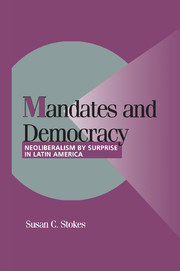Book contents
- Frontmatter
- Contents
- Preface
- 1 ELECTIONS, MANDATES, AND REPRESENTATION
- 2 ELECTIONS AND ECONOMIC POLICY IN LATIN AMERICA
- 3 EXPLAINING POLICY SWITCHES
- 4 ARE PARTIES WHAT'S WRONG WITH DEMOCRACY IN LATIN AMERICA?
- 5 NEOLIBERALISM WITHOUT MANDATES: CITIZENS RESPOND
- 6 MANDATES AND DEMOCRATIC THEORY
- 7 SUMMARY, PREDICTIONS, UNSETTLED QUESTIONS
- References
- Author Index
- Subject Index
- Titles in the series
5 - NEOLIBERALISM WITHOUT MANDATES: CITIZENS RESPOND
Published online by Cambridge University Press: 10 December 2009
- Frontmatter
- Contents
- Preface
- 1 ELECTIONS, MANDATES, AND REPRESENTATION
- 2 ELECTIONS AND ECONOMIC POLICY IN LATIN AMERICA
- 3 EXPLAINING POLICY SWITCHES
- 4 ARE PARTIES WHAT'S WRONG WITH DEMOCRACY IN LATIN AMERICA?
- 5 NEOLIBERALISM WITHOUT MANDATES: CITIZENS RESPOND
- 6 MANDATES AND DEMOCRATIC THEORY
- 7 SUMMARY, PREDICTIONS, UNSETTLED QUESTIONS
- References
- Author Index
- Subject Index
- Titles in the series
Summary
Introduction
How citizens react to governments that change course will deeply shape our normative judgment of these governments. If a government that abandoned campaign promises early in its term later wins the support of voters, there is a certain a priori power to the notion that the change of course was in voters' interest. If a government that switches is later reviled by voters, a priori we would tend to believe that the government had betrayed the voters' interests.
Yet scholars who have looked at public opinion in the aftermath of policy switches have derived very different impressions. One describes a dynamic whereby the president ignores his mandate and does as he deems best; as “failures accumulate … the country finds itself stuck with a widely reviled president whose goal is just to hang on until the end of his term” and concludes that representation is not part of this system (O'Donnell, 1994:67). Another scholar notes that “voters later had opportunities to pass judgment on the liars and the relative merits of the programs eventually adopted.” They “sometimes punished the liar's party in the next presidential elections.” But sometimes after switches “voters approved a change in the constitution to permit the incumbent president's immediate reelection, and then reelected him” (Domínguez 1998:78–79). He implies that at least accountability restores some citizen control. In this chapter I offer a more systematic assessment of citizens' responses to dramatic postelectoral changes of course.
- Type
- Chapter
- Information
- Mandates and DemocracyNeoliberalism by Surprise in Latin America, pp. 122 - 153Publisher: Cambridge University PressPrint publication year: 2001



